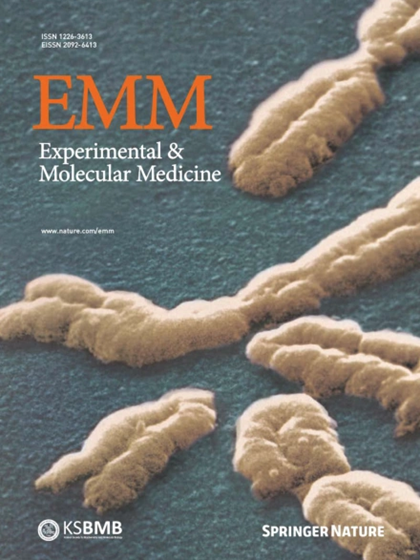SARS-CoV-2 pseudovirus dysregulates hematopoiesis and induces inflammaging of hematopoietic stem and progenitor cells
IF 9.5
2区 医学
Q1 BIOCHEMISTRY & MOLECULAR BIOLOGY
引用次数: 0
Abstract
Severe acute respiratory syndrome coronavirus 2 (SARS-CoV-2) infection primarily affects the respiratory system but may induce hematological alterations such as anemia, lymphopenia and thrombocytopenia. Previous studies have reported that SARS-CoV-2 efficiently infects hematopoietic stem and progenitor cells (HSPCs); however, the subsequent effects on hematopoiesis and immune reconstitution have not yet been described. Here we evaluated the pathological effects of infection of umbilical-cord-blood-derived HSPCs with the SARS-CoV-2 Omicron variant pseudovirus (PsV). Transcriptomic analysis of Omicron PsV-infected HSPCs revealed the upregulation of genes involved in inflammation, aging and the NLRP3 inflammasome, suggesting a potential trigger of inflammaging. Omicron PsV-infected HSPCs presented decreased numbers of multipotential progenitors (granulocyte‒erythrocyte‒macrophage‒megakaryocyte colony-forming units) ex vivo and repopulated primitive hematopoietic stem cells (Ki-67−hCD34+ cells) in an HSPC transplantation NOD-scid IL2rγnull mouse model (Omicron mouse). Furthermore, Omicron PsV infection induced myeloid-biased differentiation of HSPCs. Treatment with nanographene oxide, an antiviral agent, partially mitigated the myeloid bias and inflammaging phenotype both in vitro and in vivo. These findings provide insights into the abnormal hematopoietic and immune effects of SARS-CoV-2 infection and highlight potential therapeutic interventions. The coronavirus disease 2019 (COVID-19) pandemic highlights systemic effects of SARS-CoV-2 beyond respiratory symptoms. Researchers investigated its impact on hematopoietic stem and progenitor cells (HSPCs), which produce blood cells, using a pseudovirus mimicking the Omicron variant. Infection caused inflammation and skewed blood production toward myeloid cells (e.g., macrophages), reducing lymphoid cells (e.g., T and B cells). This imbalance mirrors immune disruptions in COVID-19, such as lymphopenia and excessive inflammation. To address these effects, researchers tested nanographene oxide (NGO), a material with antiviral and anti-inflammatory properties. NGO reduced inflammation and partially restored normal blood production without harming HSPCs. Treated cells showed improved immune balance and reduced myeloid bias. These findings reveal how SARS-CoV-2 disrupts blood cell production and suggest NGO’s potential as a therapeutic tool to manage immune imbalances in COVID-19 and other viral infections. Further studies could explore its broader clinical applications. This summary was initially drafted using artificial intelligence, then revised and fact-checked by the author.

SARS-CoV-2伪病毒使造血功能失调,并诱导造血干细胞和祖细胞发生炎症。
严重急性呼吸综合征冠状病毒2型(SARS-CoV-2)感染主要影响呼吸系统,但可能引起血液学改变,如贫血、淋巴细胞减少和血小板减少。先前的研究报道了SARS-CoV-2有效感染造血干细胞和祖细胞(HSPCs);然而,对造血和免疫重建的后续影响尚未被描述。本研究评估了SARS-CoV-2 Omicron variant pseudovirus (PsV)感染脐带血源性HSPCs的病理效应。对Omicron psv感染的HSPCs的转录组学分析显示,与炎症、衰老和NLRP3炎症小体相关的基因上调,提示炎症的潜在触发因素。Omicron psv感染的HSPC在体外表现出多潜在祖细胞(粒细胞-红细胞-巨噬细胞-巨核细胞集落形成单位)数量减少,在HSPC移植NOD-scid il - 2r - γ缺失小鼠模型(Omicron小鼠)中再生的原始造血干细胞(Ki-67-hCD34+细胞)数量减少。此外,Omicron PsV感染诱导HSPCs的骨髓偏向分化。用纳米石墨烯(一种抗病毒药物)治疗,在体外和体内都部分减轻了骨髓偏倚和炎症表型。这些发现为了解SARS-CoV-2感染的异常造血和免疫效应提供了见解,并突出了潜在的治疗干预措施。
本文章由计算机程序翻译,如有差异,请以英文原文为准。
求助全文
约1分钟内获得全文
求助全文
来源期刊

Experimental and Molecular Medicine
医学-生化与分子生物学
CiteScore
19.50
自引率
0.80%
发文量
166
审稿时长
3 months
期刊介绍:
Experimental & Molecular Medicine (EMM) stands as Korea's pioneering biochemistry journal, established in 1964 and rejuvenated in 1996 as an Open Access, fully peer-reviewed international journal. Dedicated to advancing translational research and showcasing recent breakthroughs in the biomedical realm, EMM invites submissions encompassing genetic, molecular, and cellular studies of human physiology and diseases. Emphasizing the correlation between experimental and translational research and enhanced clinical benefits, the journal actively encourages contributions employing specific molecular tools. Welcoming studies that bridge basic discoveries with clinical relevance, alongside articles demonstrating clear in vivo significance and novelty, Experimental & Molecular Medicine proudly serves as an open-access, online-only repository of cutting-edge medical research.
 求助内容:
求助内容: 应助结果提醒方式:
应助结果提醒方式:


